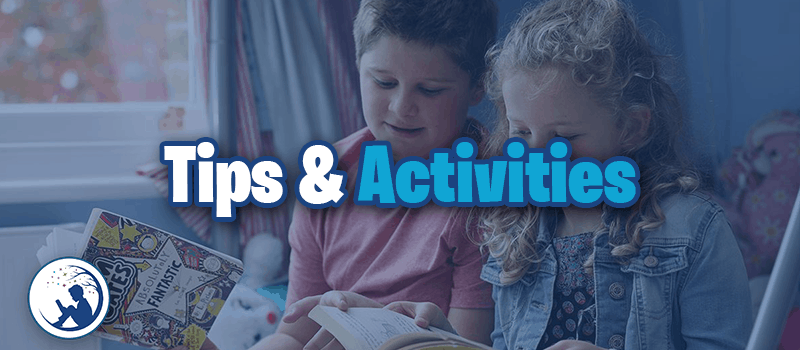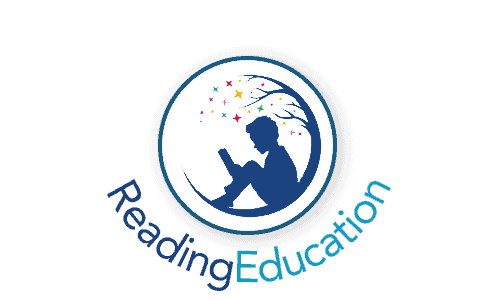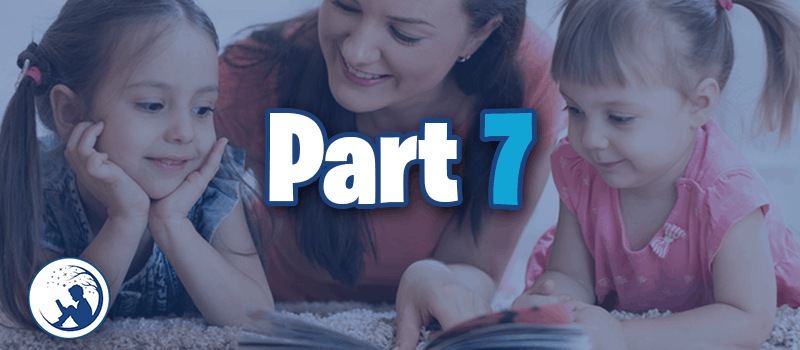Welcome to the seventh part of our ‘Teaching Your Child to Read Year-by-year’ series! In this set of articles, we’ll be looking at what your child will be learning at nursery or school and what you can do to further their reading skills at home. We’ll focus on eight age groups, which are as follows: Ages 3-4 years; ages 4-5 years, ages 5-6 years; ages 6-7; ages 7-8; ages 8-9; ages 9-10; ages 10-11. There will be one dedicated article for each age group, as well as links to all the other articles in this series to make navigation between articles as straightforward as possible (see the bottom of this page for links to other articles in this series).
Learning to Read: Children Aged 9-10 Years Old
By this point is your child’s school life, they will be encouraged to read a wide array of books to help them further develop their understanding of (different types of) language and writing. They will explore and discuss their understanding of an expansive range of books, including, but not limited to poetry, stories, play scripts, and non-fiction.
What will your child be learning at school?
Learning about root words, suffixes, and prefixes. In preceding years, your child will have started to learn about suffixes (a set of letter added to the end of a word. For example, ness creates a noun. Happy turns into happiness); however, once they reach this stage of learning, they will be introduced to both root words and prefixes. The former – root words – are words that stand on their own with the need for either prefixes or suffixes; the latter – prefixes – are a set of letters added to the start of a word to make a new word. For example, ‘clean’ becomes ‘unclean’, with ‘clean’ being the root word. Your child will utilise their understanding of suffix, prefixes, and root words to help them figure out the meaning of words and how meanings change when suffixes and prefixes are added.
Reading and talking about a wide range of books. By the ages of nine and ten, your child will both listen to and read a wide range of books, poems, plays, and non-fiction when at school. Doing so will help them develop a preference for the type of text(s) they like to read and listen to. Expanding the scope of their reading allows them to become accustomed to different types of writing and language. It is also at this stage of their learning that your child will use reference books such as dictionaries and encyclopaedias on a frequent basis.
Recommending books to classmates and friends. A vital component of becoming a reader is having the ability to talk about the books you enjoy and why you liked reading them. Therefore, your child will be encouraged to discuss this with their classmates and friends, and make book recommendations to them.
Talking about and comparing themes in books. The ever-expanding number of types of books that your child is reading will allow them to compare books and think about similarities and differences between them. Furthermore, your child will be taught to recognise these In books and make connections between them.
Learning poems and play scripts by heart. In preceding years, your child will have studied (and potentially performed) play scripts and poetry. This will continue, but with more complicated poems and scripts. Tackling more difficult poems and plays will help your child to develop their reading expression and broader understanding of such pieces of literature. In some instances, your child might be expected to learn poems by heart and recite in front of an audience.
Reading between the lines and using evidence from the text to justify their thinking. At times, information in a book or text is clear and easily understood. However, many texts are typically a little more complicated and require some degree of inference to grasp what is being said. ‘Inference’ is when the author of a book leaves the reader to read between the lines to obtain some elements of information. Your child will need to make sense of details that aren’t explicitly stated. For example, instead of the text saying simply ‘It was raining’, it might say, ‘Michael shook the water from his brolly and carefully placed her soaking raincoat on the radiator’. Being able to read between the lines and make inferences is a vital skill for comprehension at this stage of learning.
Predicting what happens next. Your child will be asked to make predictions about the book, stories, and texts they read. This could involve predicting what will happen next or what a certain character might do or say. The reason for asking a child to do this is because it helps the teacher check their understanding of what is happening in the text.
Discussing how and why authors use language. Your child will start to learn about ‘figurative language’, i.e. figures of speech such as similes, metaphors, and analogies, that are used to go beyond the literal meaning of the text. For example, ‘The mountain was covered in a blanket of white’ as opposed to ‘the mountain was covered in snow’.
Figurative language adds zest to a piece of writing (which is excellent for your child’s writing skills) or helps them to ponder an idea in a different way. Your child will be taught the effects of figurative language on the reader.
Telling the difference between opinion and fact. The wide range of fiction and non-fiction your child will have read up to this point (including letters, newspapers, websites, adverts etc.) will help develop their analytical skills, i.e. differentiating between facts the writer’s opinion.
Reading Tips & Activities for 9-10 Year Olds

Here are some of our top tips for helping your child to develop their reading skills further.
1. Keep Reading To Your Child
Although most children will prefer to read independently as this age, reading to them still has a myriad of benefits with regard to development of their comprehension. Let’s take a look at why this is:
– Reading a story or non-fiction book to your child allows them to gain access to the books that are, at present, too challenging for them to read independently. Hearing ‘challenging’ texts will help to build their comprehension skills.
– If left to their own devices, your child might opt for similar books or texts to read. Although this isn’t necessarily a bad thing, opening up their minds to new types of texts, stories and styles of writing gives them the opportunity to hear new, unfamiliar language.
– Listening to a fluent reader will help your child to understand how expressions is used and, when reading, will encourage them to bring the words on the page to life!
– Reading with your child allows them to think about and discuss ideas and thoughts about the text, which help to develop their deep thinking and analytical skills.
2. Diversify Their Reading Choices
Promote diversity in their reading by encouraging them to choose different types of books. Although most children will have a favourite genre, author or subject, make sure that they don’t neglect other types of books – even things like adverts, newspaper, and brochures can help to expand their reading comprehension by exposing them to real-word content and context.
3. Readings Clubs and Groups
Afford your child numerous opportunities to share reading recommendations and ideas as possible. By doing so, you allow them to share their excitement and desire for reading with others, which can be done through book groups and clubs. Although the vast majority of these are online nowadays, you can still find off-line options too – just do a little research online or ask at your local library (they’ll often have their own dedicated book clubs for kids).
4. Use Pictures
Although the use of pictures may seem a little long in the tooth by the time your child reaches the age of nine or ten (and perhaps a little ‘beneath’ them too), using pictures can still help to develop their reading skills. Discussing what might be happening in a picture, what certain characters might be feeling or thinking, or what might occur next in the story all help to boost reading comprehension.
5. Reading Should Have A Purpose
Although your child will be reading for pleasure, by this point in their school life, they will be reading for specific purposes. They will read to discover information, to learn about a particular topic or sub-topic, or to answer questions about something. Practising ‘reading for purpose’ can be beneficial for overall academic performance and success at school.
As part of their homework, your child may be asked to research a specific topic or find answers to questions set by their teacher in class. You can assist them with their investigations but discussing with them where they can find relevant information, e.g. specific books, the internet etc. However, it is important to be aware that some children can struggle when overloaded with information, so be at hand to help them sift through information if need be!
6. Never Give Up!
As your child gets older, they will encounter more and more challenging books and texts which they may struggle with. If they are struggling and are reluctant to carry on reading, be on hand to help them power through. You can do this by reading through parts of the text they’re having issues with and helping them to pronounce and understand words they’re unfamiliar with. Finding a balance between valuing their choice of book(s) and sensitivity is key!
Thank you for taking the time to read our blog; we really appreciate your time and hope you found this article informative and helpful. If you’re interested in reading the other posts in the ‘Teaching Your Child To Read Year-By-Year’ series, please use the links below:
Part 1 (Ages 3-4)
Part 2 (Ages 4-5)
Part 3 (Ages 5-6)
Part 4 (Ages 6-7)
Part 5 (Ages 7-8)
Part 6 (Ages 8-9)
Part 8 (Ages 10-11)
Thanks again for your time! If you have any comments, questions, or suggestions, please don’t hesitate to get in touch!

